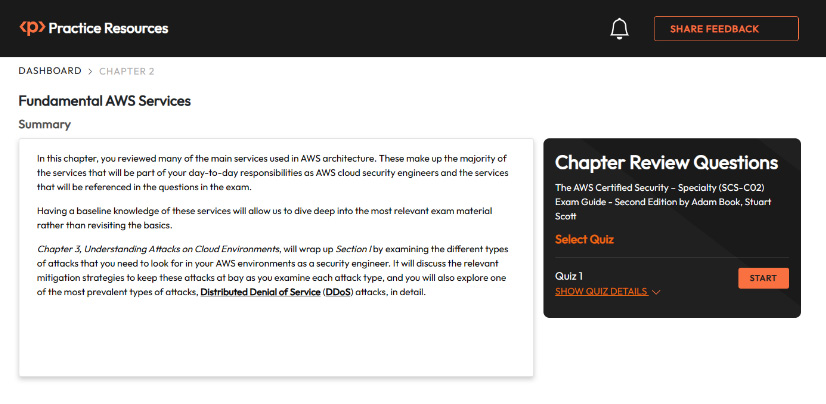In this chapter, you reviewed many of the main services used in AWS architecture. These make up the majority of the services that will be part of your day-to-day responsibilities as AWS cloud security engineers and the services that will be referenced in the questions in the exam.
Having a baseline knowledge of these services will allow us to dive deep into the most relevant exam material rather than revisiting the basics.
Chapter 3, Understanding Attacks on Cloud Environments, will wrap up Section I by examining the different types of attacks that you need to look for in your AWS environments as a security engineer. It will discuss the relevant mitigation strategies to keep these attacks at bay as you examine each attack type, and you will also explore one of the most prevalent types of attacks, Distributed Denial of Service (DDoS) attacks, in detail.
For additional information on the AWS shared responsibility model and to gain a more comprehensive understanding of AWS security, please look at the following resources:
Apart from a solid understanding of key concepts, being able to think quickly under time pressure is a skill that will help you ace your certification exam. That is why working on these skills early on in your learning journey is key.
Chapter review questions are designed to improve your test-taking skills progressively with each chapter you learn and review your understanding of key concepts in the chapter at the same time. You’ll find these at the end of each chapter.
How To Access These Resources
To learn how to access these resources, head over to the chapter titled Chapter 21, Accessing the Online Practice Resources.
To open the Chapter Review Questions for this chapter, perform the following steps:
Alternatively, you can scan the following QR code (Figure 2.13):

Figure 2.13: QR code that opens Chapter Review Questions for logged-in users

Figure 2.14: Chapter Review Questions for Chapter 2
For the first three attempts, don’t worry about the time limit.
ATTEMPT 1
The first time, aim for at least 40%. Look at the answers you got wrong and read the relevant sections in the chapter again to fix your learning gaps.
ATTEMPT 2
The second time, aim for at least 60%. Look at the answers you got wrong and read the relevant sections in the chapter again to fix any remaining learning gaps.
ATTEMPT 3
The third time, aim for at least 75%. Once you score 75% or more, you start working on your timing.
Tip
You may take more than three attempts to reach 75%. That’s okay. Just review the relevant sections in the chapter till you get there.
Target: Your aim is to keep the score the same while trying to answer these questions as quickly as possible. Here’s an example of how your next attempts should look like:
| Attempt | Score | Time Taken |
| Attempt 5 | 77% | 21 mins 30 seconds |
| Attempt 6 | 78% | 18 mins 34 seconds |
| Attempt 7 | 76% | 14 mins 44 seconds |
Table 2.1: Sample timing practice drills on the online platform
Note
The time limits shown in the above table are just examples. Set your own time limits with each attempt based on the time limit of the quiz on the website.
With each new attempt, your score should stay above 75% while your time taken to complete should decrease. Repeat as many attempts as you want till you feel confident dealing with the time pressure.